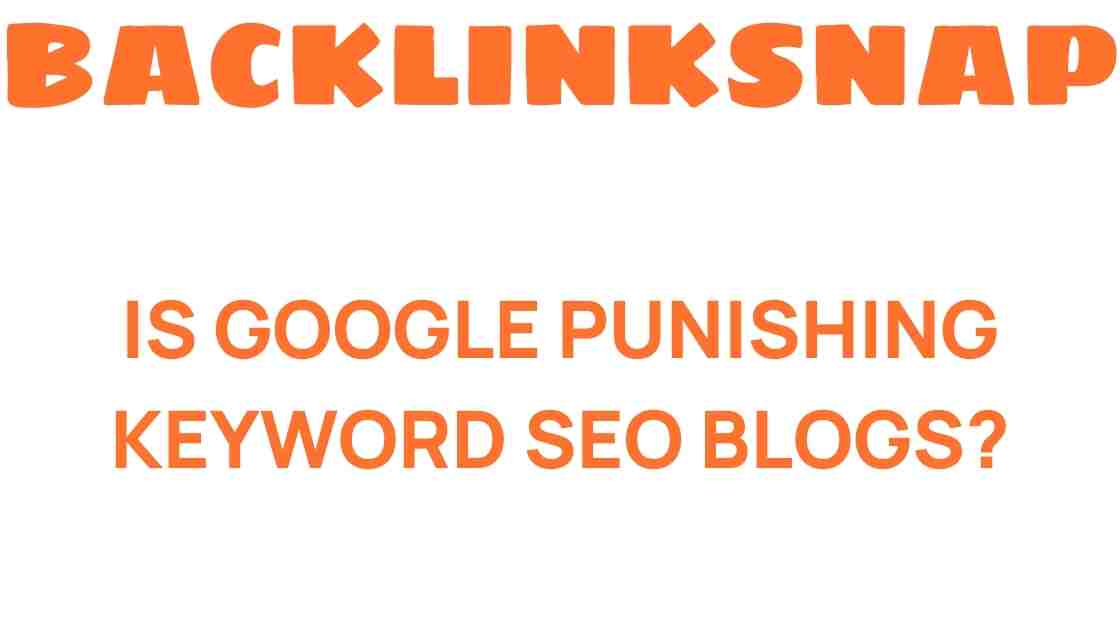Is Google Punishing Keyword SEO Blogs? Uncovering the Truth Behind Rankings
In the world of digital marketing, few topics spark as much debate as the relationship between Google’s algorithm and keyword SEO blogs. As content creators and marketers strive for better search rankings, the question looms: Is Google punishing keyword optimization? To address this, we must delve into the nuances of the Google algorithm, the evolution of SEO trends, and the importance of content quality in enhancing website traffic and online visibility.
The Evolution of the Google Algorithm
Understanding whether Google is punishing keyword SEO blogs requires a grasp of how the Google algorithm has evolved over time. Initially, search engines prioritized keyword frequency; the more a keyword appeared, the higher the potential for ranking. However, this approach led to spammy content and poor user experience. In response, Google introduced several algorithm updates, such as Panda and Penguin, aimed at rewarding high-quality content while penalizing keyword stuffing and low-value websites.
Today, the Google algorithm emphasizes a variety of factors beyond just keyword optimization. These include:
- Content Quality: High-quality, informative content that provides real value to readers is now a cornerstone of effective SEO.
- User Experience: Factors like page load speed, mobile-friendliness, and the structure of a website play significant roles in rankings.
- Backlinks: Quality backlinks from authoritative sites can enhance a page’s credibility and visibility.
- Engagement Metrics: User interaction, such as click-through rates and time spent on a page, can influence search rankings.
The Role of Keyword Optimization in Modern SEO
While keyword optimization remains a critical element of SEO, it must be approached strategically. Over-relying on keywords can indeed trigger penalties from Google’s algorithm. Instead, the focus has shifted to incorporating keywords naturally within high-quality content. Here are some effective strategies for keyword optimization:
- Long-Tail Keywords: Targeting specific phrases that potential customers might use can yield better results than generic terms.
- Keyword Context: Use keywords in context, integrating them into engaging narratives that resonate with readers.
- Latent Semantic Indexing (LSI) Keywords: These related terms can help search engines understand the content’s context without overusing primary keywords.
Content Quality: The Heart of SEO Success
In the realm of SEO blogs, content quality is non-negotiable. Google has made it clear that sites producing thin, low-value content will struggle to rank well. This shift toward prioritizing quality over quantity means that content creators must invest time and resources into crafting well-researched, engaging, and informative articles.
Here are some tips to enhance content quality:
- Research Thoroughly: Use credible sources to support your claims and provide valuable insights.
- Engage Readers: Incorporate storytelling elements, visuals, and interactive content to keep readers interested.
- Update Regularly: Refresh older content to keep it relevant and in line with current SEO trends.
Understanding SEO Trends and Their Impact
SEO trends are constantly evolving, and staying updated is crucial for maximizing online visibility. Recent trends emphasize:
- Voice Search Optimization: As more users rely on virtual assistants, optimizing for voice search is becoming increasingly important.
- Mobile-First Indexing: With a significant amount of web traffic coming from mobile devices, ensuring that sites are mobile-friendly is critical.
- Video Content: Incorporating video can increase engagement, as videos are often favored in search results.
By adapting to these trends, marketers can not only improve their search rankings but also drive more website traffic and enhance user experience.
Can Google Actually Punish Keyword SEO Blogs?
The short answer? Yes, but it’s a nuanced situation. Google doesn’t “punish” keyword SEO blogs outright; rather, it penalizes those that misuse keyword optimization tactics. Content that is overly optimized—where keywords appear unnaturally or irrelevant content is stuffed with keywords—can lead to lower rankings. Instead, the focus should be on creating well-structured, valuable content that naturally incorporates keywords.
Marketers should also be aware of the algorithms’ increasing sophistication. Machine learning and artificial intelligence play significant roles in how Google evaluates content. This means that understanding customer intent and creating content that addresses their needs is more important than ever.
Conclusion
In conclusion, while it may seem that Google is punishing keyword SEO blogs, the reality is that the algorithm is prioritizing quality and relevance over mere keyword frequency. Therefore, marketers and content creators must adapt by focusing on creating valuable, engaging content that naturally incorporates keywords. By keeping up with SEO trends and prioritizing user experience, businesses can enhance their online visibility and improve search rankings. The key takeaway? Embrace the evolution of SEO and let content quality lead the way.
FAQs
1. What is the Google algorithm?
The Google algorithm is a complex system that determines the ranking of web pages in search results based on various factors, including content quality, keyword usage, and user engagement.
2. How can I improve my SEO blog’s ranking?
Focus on creating high-quality, informative content, use strategic keyword optimization, and keep up with current SEO trends to enhance your blog’s visibility.
3. Is keyword stuffing still a valid strategy?
No, keyword stuffing is no longer a valid strategy. It can lead to penalties from Google. Instead, use keywords naturally within valuable content.
4. What are long-tail keywords?
Long-tail keywords are specific phrases that typically have lower search volume but higher conversion rates, as they target users with more specific search intents.
5. How often should I update my content?
It’s advisable to review and update your content regularly, at least once a year, to ensure it remains relevant and aligned with current SEO trends.
6. Can video content improve my SEO rankings?
Yes, incorporating video content can enhance user engagement, which is a positive signal for search rankings. It also helps diversify your content offerings.
For more information on SEO strategies, you can visit Moz’s Beginner’s Guide to SEO.
This article is in the category SEO Optimization and created by BacklinkSnap Team




